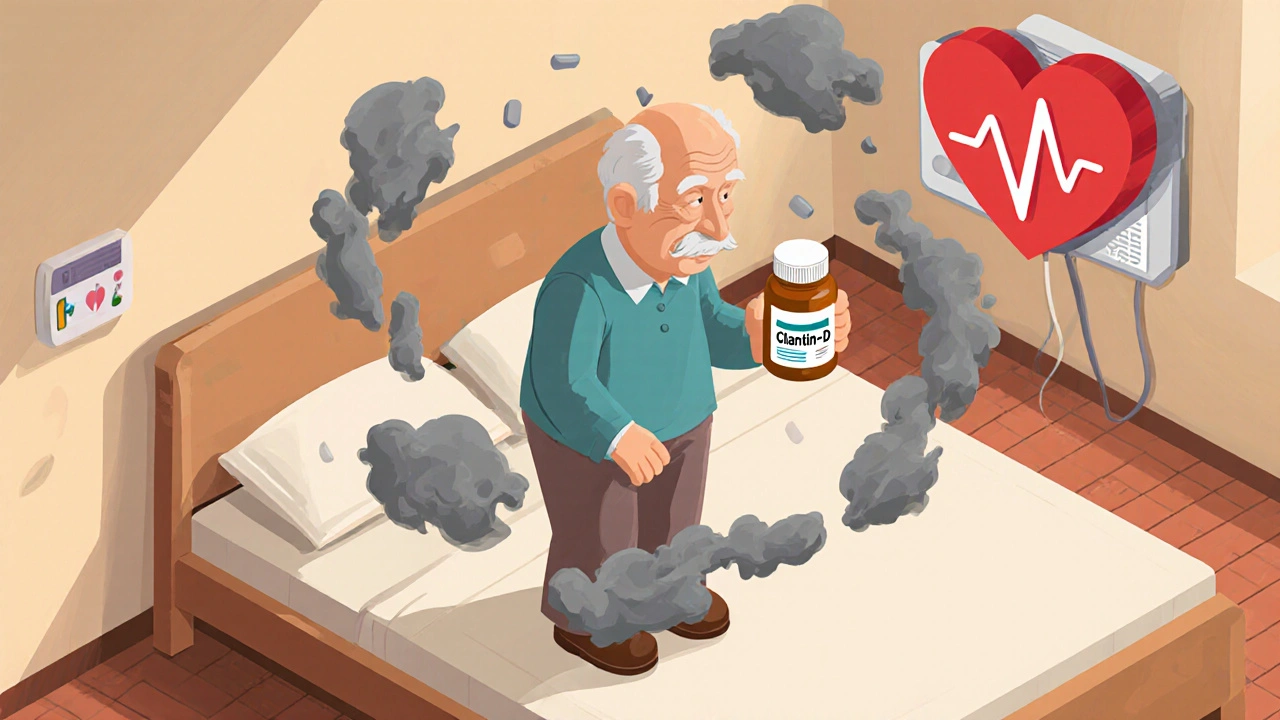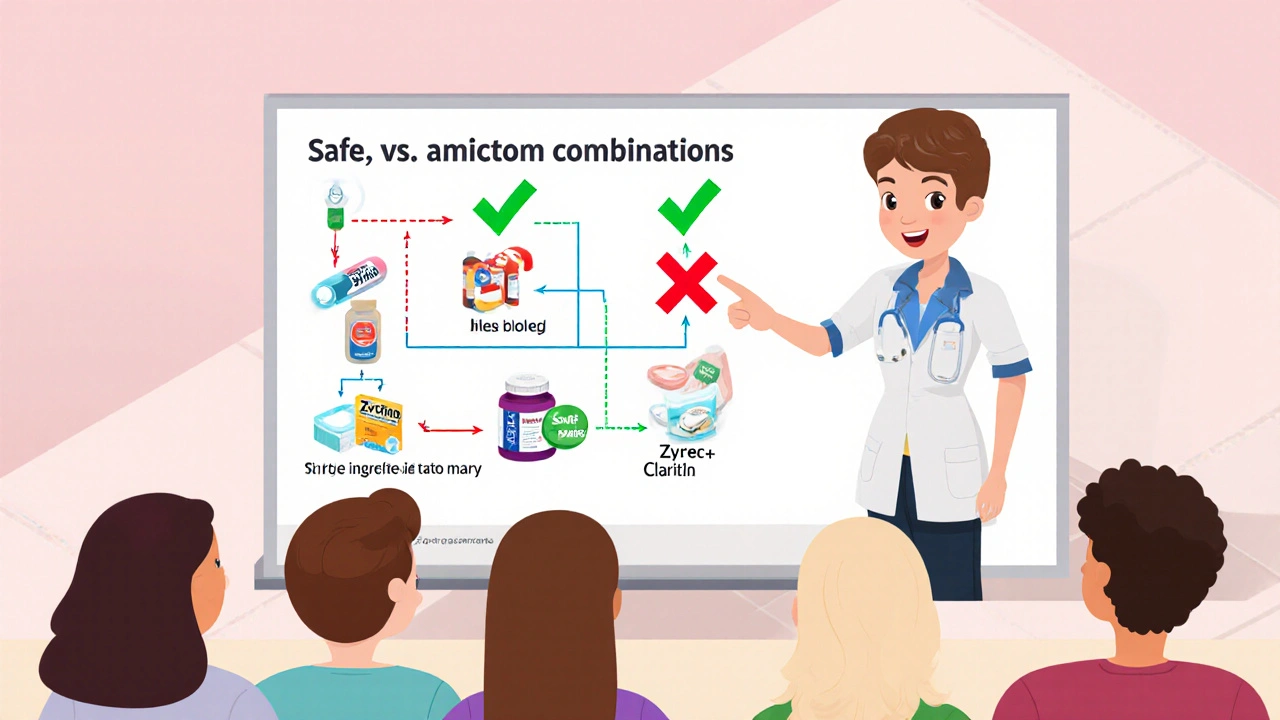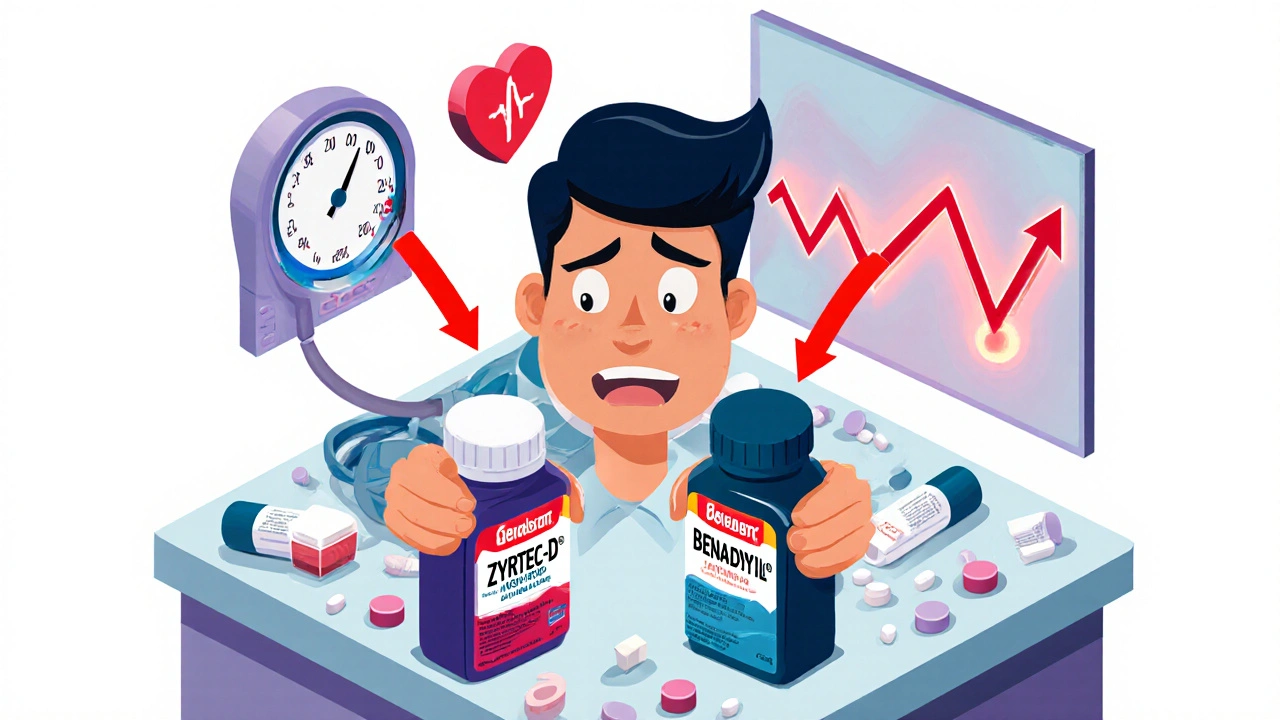Medication Interaction Checker
Check Your Medication Safety
Enter your medications and health conditions to see if combination products are safe for you.
Your Health Conditions
Your Risk Assessment
Many people reach for combination cold and allergy meds without thinking twice. Products like Zyrtec-D, Claritin-D, and Allegra-D promise quick relief from runny nose, congestion, and sneezing-all in one pill. But behind that convenience is a real risk you might not see coming.
Why These Combinations Are So Common
These pills pair a decongestant-usually pseudoephedrine-with an antihistamine like cetirizine or loratadine. The idea is simple: one part shrinks swollen nasal passages, the other stops the itch, sneezing, and drip caused by histamine. It sounds perfect. And for a while, it worked well enough that these combos became the top-selling allergy meds in the U.S.In 2022, nearly 42% of all allergy medication purchases in America were these combination products. That’s more than one in two people choosing a two-in-one solution. But just because they’re popular doesn’t mean they’re safe for everyone.
The Hidden Dangers: What the Labels Don’t Tell You
The biggest problem? People treat these like candy. They grab a Zyrtec-D for congestion, then take Benadryl later because they’re still itchy. Or they’re already on high blood pressure meds and don’t realize the decongestant could spike their numbers.Decongestants like pseudoephedrine tighten blood vessels. That’s good for your nose. Bad for your heart. In healthy adults, systolic blood pressure can rise by 1-2 mmHg. For someone with existing hypertension? That jump can be 5-10 mmHg. That’s enough to trigger chest pain, dizziness, or worse.
Then there’s the antihistamine side. First-gen ones like diphenhydramine (Benadryl) make about half of users drowsy. Even second-gen ones like cetirizine (Zyrtec) cause noticeable sleepiness in 14% of people, according to clinical studies. Combine that with a decongestant that can cause jitteriness or insomnia, and you’re playing Russian roulette with your alertness.
And don’t assume you’re safe just because it’s over-the-counter. The Poison Control Center gets hundreds of calls every year from people who took too much-either by doubling up on antihistamines or mixing these pills with other meds. Symptoms? Dry mouth, racing heartbeat, blurred vision, confusion, even seizures.
Who’s at Highest Risk?
Not everyone reacts the same. Some groups need to avoid these combos entirely.- People with high blood pressure or heart disease: Decongestants can raise blood pressure and heart rate. Even small increases can be dangerous if you have angina, arrhythmia, or a history of heart attack.
- Older adults: As we age, our bodies process drugs slower. A dose that’s fine for a 30-year-old might build up in a 70-year-old, leading to confusion, falls, or urinary retention.
- People with diabetes or thyroid problems: Decongestants can interfere with blood sugar control and thyroid medication.
- Children under 12: The American College of Allergy, Asthma, and Immunology says there’s no solid proof these combos help kids-and plenty of evidence they can harm them.
A 2022 Cochrane review found that while adults might feel slightly better, the improvement in symptoms like congestion or sneezing is so small it’s unlikely to matter in real life. For kids? No benefit at all.

Common Mistakes People Make
Here’s what goes wrong more often than you’d think:- Taking two antihistamines: Zyrtec + Benadryl? Claritin + Allegra? Don’t. You’re doubling down on side effects without extra benefit. One antihistamine is enough.
- Assuming "non-drowsy" means "no side effects": Cetirizine and loratadine are less sedating than diphenhydramine-but they still cause drowsiness in some people. Test them on a day you don’t need to drive.
- Using them longer than recommended: Decongestants should only be used for 3-5 days. After that, they stop working and can cause rebound congestion-your nose gets worse when you stop.
- Not checking other meds: Many cough syrups, sleep aids, and even some flu pills contain antihistamines or decongestants. You might be taking two without knowing it.
GoodRx tracked over 200 cases where people overdosed by combining Zyrtec and Benadryl. One person took Zyrtec in the morning, then Benadryl at night for sleep. By morning, they were dizzy, had a pounding heart, and ended up in the ER.
What Should You Do Instead?
You don’t need a combo pill to feel better. Here’s a smarter approach:- Use single-ingredient meds: Pick one symptom at a time. Need congestion? Use pseudoephedrine alone (behind the counter, but effective). Need runny nose? Use loratadine. No overlap. No surprises.
- Check every label: Look for "antihistamine" or "decongestant" in the active ingredients. If you see it twice, you’re doubling up.
- Ask your pharmacist: They see this every day. Show them what you’re taking. They’ll tell you if it’s safe.
- Try non-medication options: Saline nasal sprays, steam inhalation, and humidifiers help with congestion without any drug risks.
For most people, the benefits of these combos are minimal. The risks? Real and sometimes serious.

When to Call for Help
If you or someone else takes too much of one of these meds, watch for:- Rapid or irregular heartbeat
- Severe dizziness or confusion
- Difficulty urinating
- Seizures or loss of consciousness
Call Poison Control immediately at 1-800-222-1222. Don’t wait for symptoms to get worse. Overdoses can escalate fast.
The Bottom Line
These combination meds aren’t evil. But they’re not harmless, either. They’re powerful drugs wrapped in a friendly package. If you’re healthy, young, and only using them for a few days, you might be fine. But if you have any chronic condition, are over 65, or are taking other meds-you’re playing with fire.There’s no shame in using one medicine for one problem. In fact, it’s smarter. You’ll know exactly what’s causing any side effect. You’ll avoid dangerous overlaps. And you’ll sleep better-without the chemical cocktail.
Can I take Zyrtec and Claritin-D together?
No. Both contain antihistamines-Zyrtec has cetirizine, Claritin-D has loratadine. Taking them together doesn’t make you feel better; it just increases your risk of drowsiness, dry mouth, and dizziness. Stick to one antihistamine at a time.
Is pseudoephedrine safer than phenylephrine?
Yes, in terms of effectiveness. Phenylephrine, found in many store-brand decongestants, has been shown in multiple studies to work no better than a placebo for nasal congestion. Pseudoephedrine is still the gold standard. But both raise blood pressure, so neither is safe if you have heart disease or hypertension.
How long can I safely take a decongestant-antihistamine combo?
No longer than 3 to 5 days. After that, decongestants can cause rebound congestion, where your nose gets more blocked than before. Antihistamines can also build up in your system, especially if you’re older or taking other meds. If symptoms last beyond a week, see a doctor.
Are these combos safe during pregnancy?
Generally, no. Pseudoephedrine can reduce blood flow to the placenta and is not recommended in the first trimester. Antihistamines like loratadine and cetirizine are considered low-risk, but combining them with decongestants adds unknown risks. Always check with your OB-GYN before taking any OTC meds while pregnant.
Can I drink alcohol with these meds?
No. Alcohol makes drowsiness from antihistamines worse. It can also increase the risk of dizziness, low blood pressure, and impaired coordination. Mixing alcohol with decongestants can spike your heart rate and blood pressure dangerously. Skip the drink while taking these meds.
